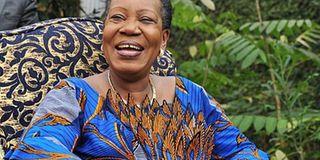When women have come to the rescue

Catherine Samba-Panza.
What you need to know:
Africa’s female presidents: From Sirleaf to Samba-Panza, Africa looks to its women to fix its broken states, Charles Mwanguhya Mpagi writes of Africa’s three female presidents.
Catherine Samba-Panza (Central African Republic)
After years of chaos and months of constant streams of blood flowing on the dusty streets of Bangui, the capital of Central Africa Republic, a miserable but highly mineral-endowed country, citizens of this former French colony turned to a woman, Catherine Samba-Panza to help heal its wounds.
Typical of the mother that she is, her first appeal on taking power was to “her children” to end the violence. “I appeal to my anti-balaka and Seleka children to listen to me and lay down your weapons,” said Samba-Panza referring to the radicalised Christian militia and its counterpart the Moslem fundamentalist group that have turned the country into a massive human slaughter house. “I am the president of all Central Africans, without exception,” said the former Mayor on succeeding Seleka leader Michel Djotodia who stepped down as interim president under international pressure over his failure to end the bloodshed.
The jury is still out on whether she succeeds or fails, but whatever the final judgment, it is a woman Central Africa, and indeed the world, turned to at the height of the troubles in that country.
Timeline
1954. Born 26 June in Chad.
1972. Moved to CAR aged 18 and worked in insurance and as a corporate lawyer. Was active in a women’s rights organisation, campaigning against female genital mutilation.
2003. Formally entered politics and chaired a reconciliation process aimed at bringing the country’s different groups together.
2012.Became the mayor of Bangui, the captial.
2014. Sworn in as interim president of CAR on 23 January, the first woman to hold the post.
Source: Internet
Ellen Johnson Sirleaf (Liberia)
She engraved her name in history as a trailblazer for women leadership on the African continent when she, in 2005, became the first elected female leader of an African country. President Sirleaf had been a high flying international economist, but the news is in the challenge she undertook in offering to lead Liberia. The country had suffered years of war and bloodshed. It was so intimidated that the choice of Charles Taylor as president was forced on the people more out of fear than presentation of a better manifesto. Taylor had waged a brutal war against the country for years, killing and miming citizens. That Sirleaf offered to challenge him in an election was in itself an act of great courage. Currently, serving her second term, she has won two awards including the coveted Nobel Peace Prize and the Indira Ghandi award.
Joyce Hilda Banda (Malawi)
Joyce Hilda Banda is the President of Malawi, another troubled African country, which she constitutionally inherited on April 7, 2012 after the sudden death of President Bingu wa Mutharika. Despite having been a vice President since 2009, the sudden demise of President Mutharika saw Banda face the real challenges many aspiring women face simply because they are women. It is assumed she had hit the glass ceiling as the mainly male political actors in Malawi worked to find a “rightful” successor despite the fact that the constitution provided for the Vice President to take over. Her reign has, however, been marred by hunger and starvation and accusation of massive corruption.
Samba-Panza: Africa’s third female president
Catherine Samba-Panza, a 59-year-old corporate lawyer, was last month voted interim president of the Central African Republic, becoming the republic’s first female president, and the third in Africa after Malawian president, Joyce Banda, and Liberia’s Ellen Johnson Sirleaf.
The emphasis on her sex is no mere media contrivance. Many Central Africans say that a woman, and mother, is best placed to bring reconciliation. The first female leader of CAR, she has inherited a hellish legacy that leaves her trying to pull the country back from the brink of civil war. Last March, the most recent of many coups brought a mostly Muslim rebel coalition to power over the majority Christian population. A Christian, she has earned respect from both sides of the sectarian divide.
Born to a Cameroonian father and a Central African mother, she went to university in France, where two of her three children still live. Her husband, a former cabinet minister, is said to be suffering a debilitating illness.




